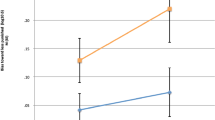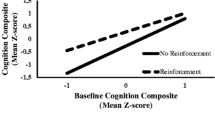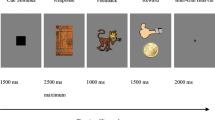Abstract
The effects of continuous and partial reward on the performance of hyperactive and normal children on a concept identification task were compared. Because reduction in information feedback is usually associated with partial reward schedules, the study was designed to yield information regarding the contribution of reduced feeback to performance in the partial reward condition. Previous findings of a performance deficit in hyperactives under partial reward were replicated. The findings help rule out an information feedback explanation for this deficit. The authors suggest that a motivational factor involving the elicitation of frustration when expected rewards fail to appear may be responsible for the poor performance of hyperactives on the partial schedule.
Similar content being viewed by others
References
Amsel, A. The role of frustrative nonreward in noncontinuous reward situations.Psychological Bulletin, 1958,55, 102–119.
Amsel, A. Frustrative nonreward in partial reinforcement and discrimination learning: Some recent history and a theoretical extension.Psychological Review, 1962,69, 306–328.
Ayllon, T., Layman, D., & Kandel, H. A behavioral-educational alternative to drug control of hyperactive children.Journal of Applied Behavior Analysis, 1975,8, 137–146.
Barkley, R. A., Copeland, A. P., & Sivage, C. A self-control classroom for hyperactive children.Journal of Autism and Developmental Disorders, 1980,10, 75–89.
Cohen, N.J. Psychophysiological concomitants of attention in hyperactive children. Unpublished doctoral dissertation, McGill University, 1970.
Cunningham, S. J., & Knights, R. M. The performance of hyperactive and normal boys under differing reward and punishment schedules.Journal of Pediatric Psychology, 1978,3, 195–201.
Douglas, V. I. Treatment approaches: Establishing inner or outer control? In C. K. Whalen & B. Henker (Eds.),Hyperactive children: The social ecology of identification and treatment. New York: Academic Press, 1980.
Douglas, V. I. Attentional and cognitive problems. In M. Rutter (Ed.),Developmental neuropsychiatry. New York: Guilford Press, in press-a.
Douglas, V. I. The psychological processes implicated in attention deficit disorder. In L. M. Bloomingdale (Ed.),Attention deficit disorder. Jamaica, New York: Spectrum, in press-b.
Douglas, V. I. Attention deficit disorder in children: Are we any further ahead?Canadian Psychology/Psychologie Canadienne, in press-c.
Douglas, V. I., & Peters, K. G. Toward a clearer definition of the attentional deficit of hyperactive children. In G. A. Hale & M. Lewis (Eds.),Attention and cognitive development. New York: Plenum Press, 1979.
Errickson, E. A., Wyne, M. D., & Routh, D. K. A response-cost procedure for reduction of impulsive behavior of academically handicapped children.Journal of Abnormal Child Psychology, 1973,1, 350–357.
Firestone, P., & Douglas, V. I. The effects of reward and punishment on reaction times and autonomic activity in hyperactive and normal children.Journal of Abnormal Child Psychology, 1975,3, 201–215.
Firestone, P., & Douglas, V. I. The effects of verbal and material rewards and punishers on the performance of impulsive and reflective children.Child Study Journal, 1977,7, 71–78.
Freeman, R.J. The effects of methylphenidate on avoidance learning and risk-taking by hyperkinetic children. Doctoral dissertation, University of Waterloo, 1978.
Freibergs, V., & Douglas, V. I. Concept learning in hyperactive and normal children.Journal of Abnormal Psychology, 1969,74, 388–395.
Gordon, M. The assessment of impulsivity and mediating behaviors in hyperactive and nonhyperactive boys.Journal of Abnormal Child Psychology, 1979,7, 317–326.
Gorenstein, E. E., & Newman, J. P. Disinhibitory psychopathology: A new perspective and a model for research.Psychological Review, 1980,87, 301–315.
Hemry, F. R. Effect of reinforcement conditions on a discrimination learning task for impulsive versus reflective children.Child Development, 1973,44, 657–660.
Kagan, J. Reflection-impulsivity: The generality of dynamics of conceptual tempo.Journal of Abnormal Psychology, 1966,7, 17–24.
Kendler, H. H., Kendler, T. S., Pliskoff, S. S., & D'Amato, M. F. Inferential behavior in children: I. The influence of reinforcement and incentive motivation.Journal of Experimental Psychology, 1958,55, 207–212.
Lambert, W. M., Lambert, E. C., & Watson, P. D. Acquisition and extinction of an instrumental response sequence to the token-reward situation.Journal of Experimental Psychology, 1953,45, 321–326.
Longstreth, L. E. The relationship between expectations and frustration in children.Child Development, 1960,31, 667–671.
Lykken, D. T. A study of anxiety in the sociopathic personality.Journal of Abnormal and Social Psychology, 1957,55, 6–10.
Mash, E., & Dalby, T. A review of behavior modification with hyperactive children. In R. Trites (Ed.),Hyperactivity. Baltimore: University Park Press, 1978.
Massari, D. J., & Schack, M. L. Discrimination learning by reflective and impulsive children as a function of reinforcement schedule.Developmental Psychology, 1972,6, 183.
O'Leary, K. D. Pills or skills for hyperactive children.Journal of Applied Behavior Analysis, 1980,13, 191–204.
Osier, S. F., & Shapiro, S. L. Studies in concept attainment: IV. The role of partial reinforcement as a function of age and intelligence.Child Development, 1964,35, 623–633.
Parry, P.The effect of reward on the performance of hyperactive children. Unpublished doctoral dissertation, McGill University, 1973.
Peters, R. DeV. The optional shift performance of reflective and impulsive girls.Journal of Experimental Child Psychology, 1979,27, 310–320.
Quay, H., Sprague, R., Werry, S., & McQueen, M. Conditioning visual orientation of conduct problem children in the classroom.Journal of Experimental Child Psychology, 1967,5, 512–517.
Rapport, M. D., Murphy, H. A., & Bailey, J. S. Ritalin vs. response cost in the control of hyperactive children: A within-subject comparison.Journal of Applied Behavior Analysis, 1982,15, 205–216.
Ryan, T. J., & Watson, D. Frustrative nonreward theory applied to children's behavior.Psychological Bulletin, 1968,2, 111–125.
Schmauk, F. J. Punishment, arousal and avoidance learning in sociopaths.Journal of Abnormal Psychology, 1970,76, 325–335.
Spence, J. T. The distracting effects of material reinforcers in the discrimination learning of lower-and middle-class children.Child Development, 1970,41, 103–112.
Stein, N., & Landis, R. Differential reinforcement of low rates performance by impulsive and reflective children.Journal of Experimental Child Psychology, 1975,19, 37–50.
Walker, H. M., & Buckley, N. K. The use of positive reinforcement in conditioning attending behavior.Journal of Applied Behavior Analysis, 1968,1, 245–250.
Watson, P. Individual differences in children's reactions to frustrative nonreward.Journal of Experimental Child Psychology, 1970,10, 216–234.
Watson, P. Individual differences in children's reactions to reward and nonreward.Journal of Experimental Child Psychology, 1971,12, 170–181.
Wender, P,Minimal brain dysfunction in children. New York: Wiley, 1971.
Wender, P. H. The minimal brain dysfunction syndrome in children.Journal of Nervous and Mental Disease, 1972,155, 55–71.
Werry, J., Weiss, G., Douglas, V. I., & Martin, J. Studies on the hyperactive child III: The effect of chlorpromazine upon behavior and learning ability.Journal of the American Academy of Child Psychiatry, 1966,5, 292–312.
Whalen, C. K., & Henker, B. (Eds.).Hyperactive children: The social ecology of identification and treatment. New York: Academic Press, 1980.
Wolraich, M., Drummond, R., Salomon, M. K., O'Brien, M. L., & Sivage, C. Effects of methylphenidate alone and in combination with behavior modification procedures on the behavior and academic performance of hyperactive children.Journal of Abnormal Child Psychology, 1978,6, 149–161.
Worland, J. Effects of positive and negative feedback on behavior control in hyperactive and normal boys.Journal of Abnormal Child Psychology, 1976,4, 315–326.
Worland, J., North-Jones, M., & Stern, J. A. Performance and activity of hyperactive and normal boys as a function of distraction and reward.Journal of Abnormal Child Psychology, 1973,1, 363–377.
Author information
Authors and Affiliations
Additional information
This research was supported by Grant No. 943-03-34 from the Social Sciences Research Fund, McGill University.
Rights and permissions
About this article
Cite this article
Parry, P.A., Douglas, V.I. Effects of reinforcement on concept identification in hyperactive children. J Abnorm Child Psychol 11, 327–340 (1983). https://doi.org/10.1007/BF00912095
Revised:
Issue Date:
DOI: https://doi.org/10.1007/BF00912095




